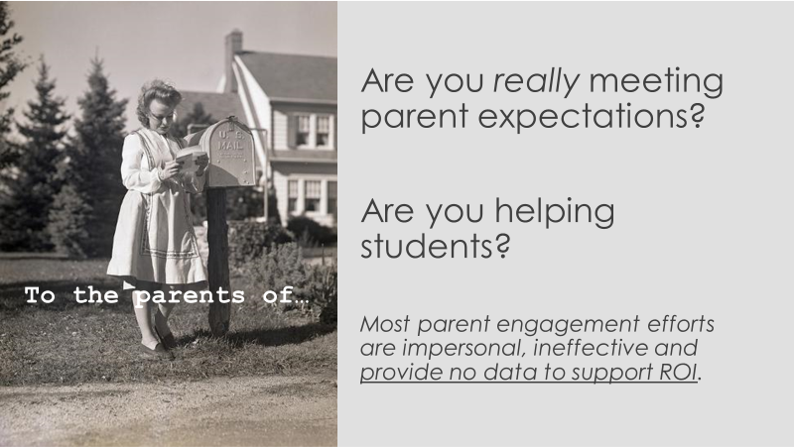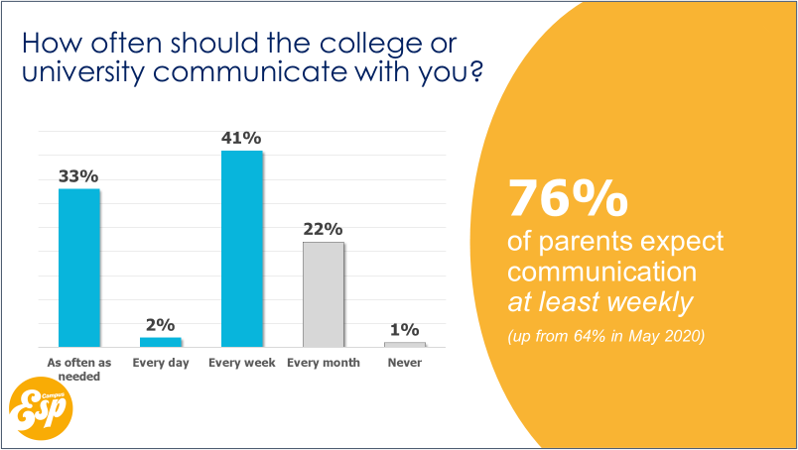8 insights to guide your parent engagement strategy
I teamed up with Sarah Coen, Vice President of Strategic Initiatives and Enrollment Management at Transylvania University, to present the future of parent and family engagement at the 2021 Ruffalo Noel Levitz National Conference.
The takeaway? Parent involvement in college is at an all-time high. Most schools are looking for ways to focus that involvement on student enrollment outcomes, student success metrics, and parent giving goals.
Not sure where to start? Here are 8 insights to guide your parent engagement strategy.
#1
Don’t make it about parents.
Make it about your goals.
There are a lot of good reasons to engage with parents and families. A quick look at the CampusESP customer base shows the most common priorities and goals for how schools think about parent engagement.
When starting your parent engagement strategy, it’s often a good idea to start in one area – in one department – in order to launch your program quickly. Once you get feedback from parents, you can always expand to other areas.
#2
Parents influence enrollment.
You should influence parents.
99% of parents say they are involved in their student’s college planning. The other 1%? Well, we’re pretty sure they hit the wrong button on the survey.
Sarah Coen states a growing trend for colleges and universities: It’s important to “engage parents earlier in the process. Parents are the top influencer of this generation.”
#3
Parent involvement is increasing.(gasp!).
Parent involvement in post-secondary education has always been high, but it spiked when the pandemic hit. This chart shows monthly active users in CampusESP, one measure of parent engagement levels.
On average, parent engagement has been 5x higher since the start of the pandemic.
It’s also important to note that parent involvement spikes during the summer when parents of newly enrolled students engage in orientation activities and parents of prospective students start their college search. The summer is your biggest opportunity to influence parents and set involvement expectations.
#4
Parent engagement in higher education can improve student yield.
The premise is obvious, but the results are surprisingly measurable. At CampusESP, we see the greatest impact:
At the top of the funnel, where students with a parent in CampusESP are 3x more likely to convert from inquiry to applicant
At the bottom of the funnel, where we see yield rates up to 6% higher when parents are engaged
What’s the best way to differentiate your marketing efforts? Per Sarah Coen, “Communicate your value proposition (outcomes, outcomes, outcomes) early and often. Parents are skeptical of the cost of higher education, so tell them WHY you are worth it.”
Looking for more on the impact of parent engagement on student enrollment? Download the research and see a video HERE
#5
Parents expect personalization.
We’ve all seen mailers addressed “to the parents of…” It’s old school. And not in a good way.
Today’s parents have higher expectations that have been set in high school (and earlier) with apps like Class Dojo and Remind. They expect personalized content to help them play a role in student success.
Is your strategy meeting parent expectations? What are the measures that show you have the impact you want? At CampusESP, we see most parent email open rates approach 60% by the time a student enrolls.
Per Sarah Coen, “parents want communication that is targeted directly to them. Copying parents on student communication is adequate but not great. They expect you to talk directly to them!”
#6
Parent engagement can improve student retention.
Perhaps most surprising is that parent engagement can help student persistence. Our research indicates that student persistence can increase up to 15% when parents are sent alerts on financial aid, holds, and student status changes.
Much of this data is protected by FERPA. CampusESP includes an electronic FERPA waiver system to balance student privacy with parent communication expectations effortlessly.
#7
Parents want weekly communication.
They told us so.
In 2021, RNL and CampusESP partnered on the largest survey of college parents in history. 36,400 parents from 56 institutions responded. One of the most surprising results? 76% expect communication from their student’s college at least weekly.
In 2022, we sent the survey out again. The results were even more surprising. 85% expect communication at least weekly.
When it comes to communication with parents and families, the expectations are high. Most colleges are not meeting those expectations.
#8
Set parent involvement expectations early… or else they will.
Before we built CampusESP, we surveyed 7,843 parents at 14 colleges and universities and asked, “do you have your students’ college IDs and passwords? 61% said yes. Yikes.
Telling parents not to be involved is not going to work. Telling parents how to be involved is your best involvement strategy. They want their student to succeed, and so do you. The best strategy is to turn your parents into your partners.
If you are interested in creating successful parent involvement strategies, talk to one of our experts to get started.










